At Bharti Airtel, we continue to be a leading global telecommunications company with operations in 17 countries and close to 2 Bn satisfied customers. Our transformational network transcends continents, geographic borders and cultures; and enables people to do more in a largely volatile, globalised and hyper-connected era.

At Bharti Airtel, our objective is to assist the socio-economic progress of communities to help accelerate economic progress and social well-being. We undertake an integrated approach to the welfare of communities through our diverse initiatives in the realms of education, employment generation, sanitation, healthcare, disaster management and environment protection, among others. We believe that our need-based interventions sustainably empower people by opening up new possibilities for them and thus driving social transformation.
As the philanthropic arm of Bharti Enterprises, Bharti Foundation was set up in 2000 with the vision “to help underprivileged children and young people of our country realise their potential”. The Foundation offers access to quality education to the marginalised sections of society across rural India. The Foundation implements and supports programs in the spheres of primary, elementary and senior secondary education through its Satya Bharti School Program as well as through Government School interventions under its Satya Bharti Quality Support Program and Satya Bharti Learning Centres Program. It also has higher education programs in partnership with institutions like Indian Institute of Technology (IIT) – Delhi & Mumbai,
Indian School of Business – Mohali, Boston University, University of Cambridge – UK, Newcastle University – UK etc. Through ‘Satya Bharti Abhiyan’, its rural saniation initiative, the Foundation has completed the provision of individual household toilets in rural Ludhiana.
Members of the Bharti Foundation Governing Board, including Sunil Bharti Mittal, Rakesh Bharti Mittal, Syeda Imam, Professor V.S. Raju, Ashish Dhawan, Vinod Dhall, Kalpana Morparia, V V Ranganathan and Badri Agarwal were hosted by Vijay Chadda, CEO and Mamta Saikia, COO, Bharti Foundation as they joined students of Satya Bharti Schools for the 10 year celebrations in Amritsar.
Bharti Foundation’s newly launched ‘Nyaya Bharti’ program provides legal and financial assistance for bail, to deserving underprivileged undertrials, languishing in jails across the country for minor offences.
Bharti Foundation’s flagship initiative, the Satya Bharti School Program completed 10 years of operations in FY (Fiscal Year) 2016-17. Commencing its journey in 2006, Satya Bharti Schools continue to impact the lives of underprivileged children through free quality education with the goal of transforming them into employable and responsible future citizens.
The schools are located in remote villages of Punjab, Rajasthan, Haryana, Uttar Pradesh, Tamil Nadu and West Bengal. The schools impart quality education to under privileged students, completely free of cost and maintain a focus on the girl child. Besides, the schools also provide welfare schemes such as free nutritious mid-day meals, textbooks, notebooks, shoes, stationery, etc.
Satya Bharti School Program: Key Performance Indicators
| Schools | 254 |
| States | 06 |
| Students | 43,527 |
| Percentage of girls | 49% |
| Percentage of children from SC/ST/OBC communities | 75% |
| Teachers | 1,677 |
| Percentage of female teachers | 66% |
Data as on March 31, 2017
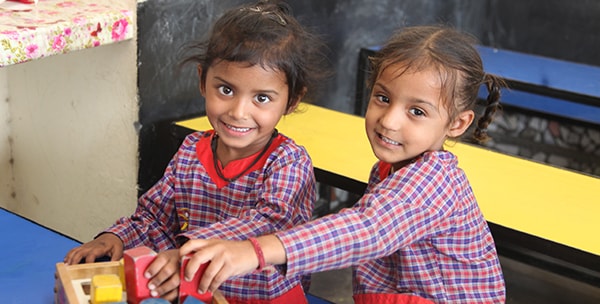

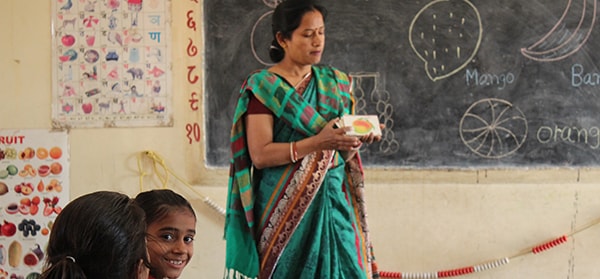
Satya Bharti School Program (2016–17):
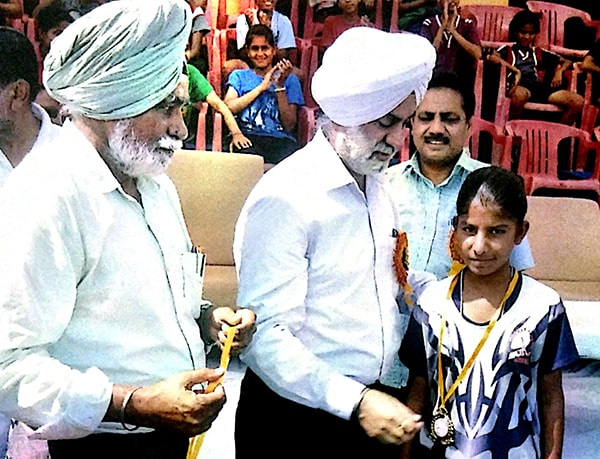
Anmolpreet,
Alumnus, Satya Bharti School, Jalaldiwal, Punjab
Gurnam Singh, father of Anmolpreet Kaur, is a daily wage labourer. He was determined to send his daughter to school. The Satya Bharti School in Jalaldiwal (Punjab) gave him the opportunity to educate Anmolpreet free of cost.
The timid little girl transformed into a confident student, nurtured under the guidance of Satya Bharti School teachers. With the holistic development approach at her school, Anmolpreet soon realised her penchant for sports.
Anmolpreet expressed her interest in hockey and soon began to wield the stick showcasing her prowess in the sport. A local hockey coach offered free after-school coaching to her and other students in the school grounds. Training rigorously for two years, soon she was hailed as the little hockey champ of Jalaldiwal. Her hard work and the encouragement of her school helped her earn a scholarship in a sports school (Mata Jaswant Kaur Memorial Academy), Muktsar, Badal (Punjab) where she receives special training to hone her skills along with continued education.
Anmolpreet had already represented her school at the cluster level, winning medals for her team, today she is part of the successful State Girls Team. Despite hardships, Anmolpreet has set a stellar example for girls in her community to emulate. With gleaming eyes, she adds, “My journey has just begun, and the best is still to come!’’
The Satya Bharti Quality Support Program, initiated in 2013, provides need-based interventions to improve the quality of the schooling experience for students and stakeholders in Government schools. The learning acquired from the flagship Satya Bharti School Program is being transferred to the Government schools under this and other Government school initiatives. Bharti Foundation takes innovative steps to enhance a Government school’s performance by:
Satya Bharti Quality Support Program – Key Performance Indicators
| Schools (In seven states*) | 323 |
| Teachers | 5,133 |
| Students | 1,24,856 |
Data as on March 31, 2017
*Punjab, Haryana, Rajasthan, Delhi, Telangana, Goa and Jammu & Kashmir

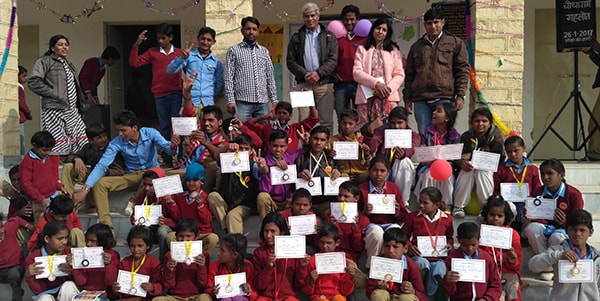
Satya Bharti Quality Support Program (2016–17):
The Satya Bharti Learning Centres Program works towards addressing the issue of Out of School Children (OOSC). In 2012, the Foundation tied up with Educate A Child (EAC), a global initiative under the Qatarbased Education Above All (EAA) institution. The Satya Bharti Learning Centre Program mainstreams OOSC back into schools by identifying and enrolling them into Government schools through bridge courses that offer them an age-appropriate education.
This project, in partnership with Educate A Child (EAC) - aims to ensure age and grade appropriate enrolment in schools of children who are “out of school” or at risk of dropping out due to low engagement, parent’s apathy or lack of access. In addition, the implementing partners are ‘Humana People to People India’, ‘Education Support Organisation (Gyan Shala) and ‘Educate Girls’, impacting a large number of children.

Satya Bharti Learning Centres Program (2016–17):
Satya Bharti Learning Centres – Key Performance Indicators
| Centres | 223* |
| Children impacted | 29,756 |
| Children enrolled | 2,363 |
| Children mainstreamed | 23,676 |
| % of girls | 50% |
| % of SC/ST/OBC students | 98% |
| Education volunteers | 290 |
Data as of March 31, 2017
All centres are within government schools
*942 centres have been closed as most of the OOSC’s in these villages have been mainstreamed (number included in overall impact); in some villages the count of OOSC’s have dropped to such a low figure that it has gone below the minimum numbers required to run a centre, as per Government norms.
50 Centres had to be closed because of unavailability of qualified education volunteers.
Three Centres were closed due to mass migration (Madhya Pradesh).
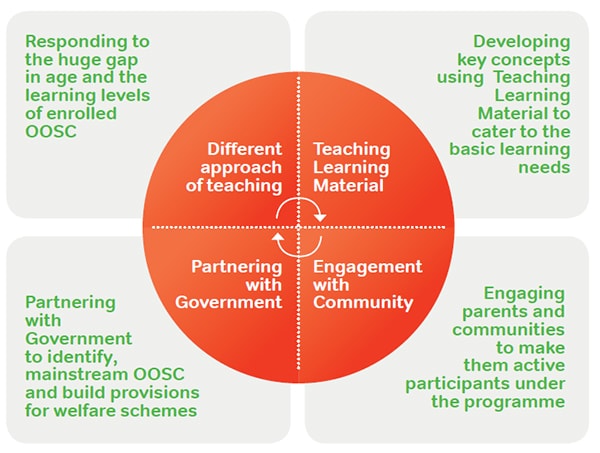
This initiative aims to improve sanitation facilities beginning with rural Ludhiana. Phase I of the program has been completed in a short span of time, given the scale and geographic spread of the District. Individual household toilets were provided in every household of rural Ludhiana, which lacked one. In addition, 14 Government schools, identified by Punjab Education Development Board, have been provided with a separate toilet for girls.
In its second phase, the program is being ramped up to the urban areas of Ludhiana to support the district administration’s efforts.
Satya Bharti Abhiyan – Key Performance Indicators:
| Direct beneficiaries | 86,582 |
| Individual toilets handed over | 17,628 |
| Girls’ toilets in Government schools | 14 |
Data as of March 31, 2017
*Punjab, Haryana, Rajasthan, Delhi, Telangana, Goa and Jammu & Kashmir

Bharti Foundation continues its partnership with Indian Institute of Technology, Delhi that was initiated in 2000 with the Bharti School of Telecommunication Technology and Management, IIT Delhi. A Bharti Centre for Communication was also set up in Mumbai in partnership with IIT Bombay. Under the Manmohan Singh Bursary Fund, the Foundation recognises and awards exceptionally talented students with scholarships to pursue their studies at The Cambridge University, UK. In Mohali, the Foundation set up Bharti Institute of Public policy in a tri-partite a partnership between Indian School of Business, Bharti Enterprises and Fletcher School of Law and Diplomacy, Tufts University (USA.).
The University of Cambridge and Bharti Foundation, signed a Memorandum of Understanding (MoU) on September 12, 2016 to conduct baby corn crop improvement research program in India. The program is being funded through a grant from Bharti Foundation to the University of Cambridge. The grant supports a threeyear research program carried out between Cambridge’s Department of Plant Sciences and the Cambridge Centre for Crop Science (3CS), Punjab Agricultural University and Fieldfresh Foods.
‘Nyaya Bharti’ is a one-of-its-kind corporate social responsibility (CSR) initiative by Bharti Enterprises, one of India’s most respected business groups. The primary objective of Nyaya Bharti is to provide aid to the under privileged undertrials who are first time offenders accused of petty offences, requiring legal/financial assistance for release on bail. It also extends assistance to certain poor first time convicts undergoing imprisonment for petty offences due to their inability to pay petty fines imposed by the courts. The Governing Board of Nyaya Bharti is headed by Justice (Dr.) A.S. Anand, former Chief Justice of India.
The Nyaya Bharti initiative aims at providing legal and financial assistance to underprivileged prison inmates. Nyaya Bharti through its endeavours, complements the legal aid work being undertaken by National Legal Services Authority (NALSA) and State Legal Services Authorities (SLSAs), set up under statute legislated by the Parliament. The office of Nyaya Bharti is located in New Delhi.
As a part of the Nyaya Bharti initiative, 43 bail orders have been obtained and gross release of 38 under trials has been affected.
The Airtel Delhi Half Marathon (ADHM) is an effective platform to bring together corporates, individuals, employees and students of schools and colleges and give them the opportunity to raise awareness about the Satya Bharti School Program, raise funds and enjoy the marathon run.
The Young Leader Programme is a two-week initiative part of the corporate induction to engage new team members of Bharti Airtel as volunteers to support various initiatives of Bharti Foundation.
It is an employee payroll giving program for Bharti Group of Companies. This Program encourages employees of Bharti Airtel to give back to society in terms of money, time, skills or knowledge
We continued the scholarship and skill development programme for underprivileged students of Chhindwara District, Madhya Pradesh. During the year we have trained students from various domains on employability skills helping them to become corporate ready. Over 200 underprivileged students were granted scholarship during the financial year 2016-17. Under the program, we also impart coaching to the underserved youth for competitive exams helping them get selected for central/state government jobs. Additionally we run self-employed tailor course for women empowerment program in the tribal areas of Chhindwara.
Anubandh, situated on the outskirts of Jodhpur, helps senior citizens deserted by their families. We partnered and supported Anubandh in furtherance of their initiatives.
Donations Under Act
| ACT Employee Contribution | ACT Employer Contribution | Total ACT Contribution | |
| Total* | 3,837,464 | 5,246,173 | 9,083,637 |
All figures in `
*Companies included are Bharti Airtel Ltd, Bharti Airtel Services Ltd and Telesonic Networks Ltd.
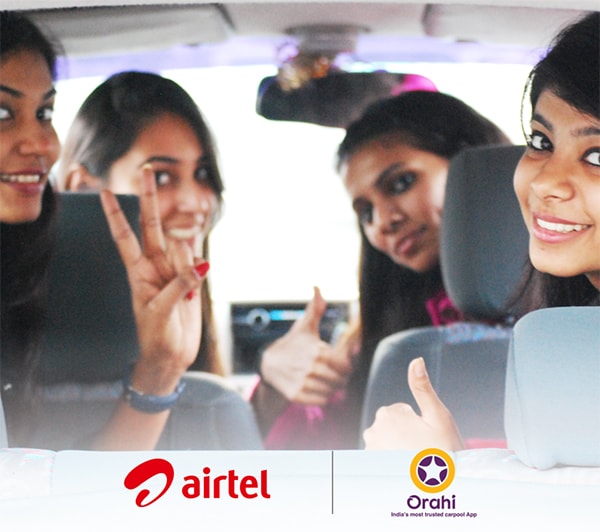
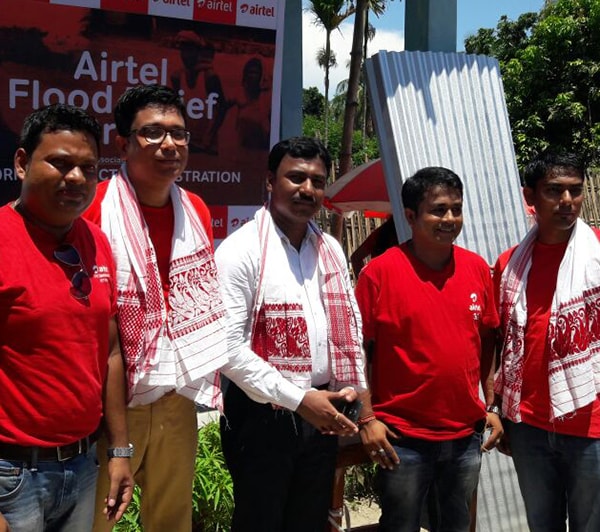
We also partnered and supported various programmes and initiatives of charitable institutions such as Action for Autism, CRY, HelpAge India, National Association for the Blind, Save life Foundation, SOS Children Villages of India and The Banyan, among others.
The main areas of focus of this project supported by Airtel is to empower 1,722 children (722 children in Mumbai and 1,000 children in Delhi) in the area of right to education, gender equity, awareness on health and hygiene, right to play, life skills and leadership through Magic Bus’ Sports based and mentorship approach. The aim of the project is to bring about a positive change in the attitudes and behaviours of children.
Employees at Airtel Circle Offices engage themselves on various fronts to ensure development and progress across India.
The devastating Vardah cyclone in December 2016 wreaked havoc on several parts of Tamil Nadu. Our Network Team worked round the clock on a war footing to keep the services running. Many of our team members stayed back and carried out restoration work in all affected sites. Similarly, following the demise of the former Tamil Nadu Chief Minister, we strengthened our vigil. We joined hands with the law enforcing authorities and ensured an uninterrupted network coverage by deployment of additional mobile sites near the Memorial sites to support additional voice and data traffic.
Majuli in Assam is the largest river island in the world. The island suffered severe floods last year owing to unprecedented rainfall, which affected the lives of hundreds. We provided relief to those afflicted by the flood. People on the island were provided with roofing sheets that protected them from incessant rainfall.
At Bharti Airtel, we introduced innovative measures to help protect our environment. One such measure was the Pool2Park campaign by Airtel centre in Delhi. As the Delhi government had introduced its odd-even vehicle rule in January last year, we tried to address the concern of the people. We partnered with Orahi and launched our cab service for our employees. They could easily commute to their office even during the odd-even rule. This not only benefited the employees but also was a green initiative to reduce the city’s carbon footprint. As people started to share their ride to their offices, the number of cars reduced in the city.
18,665
Kg of CO2 footprint was saved by the Pool2Park campaign
1,85,000+
km of distance was shared between the passengers of Pool2Park
`96,250
Donated by employees of Rajasthan Circle Office to Satya Bharti Foundation in the JGW.
Like every year, we celebrated the Joy of Giving Week (JGW) across different states of the country. Employees at our Rajasthan Circle Office spent the JGW by voluntarily donating to Bharti Foundation. In Bangalore, we partnered with different NGOs and organised an event called ‘Food for Change’. The event was an initiative to help raise funds for the NGOs. Airtel employees, with their families, set up food stalls at a prime location in the city. The money collected from selling the food was donated to NGOs.
Bharti Airtel’s Mysore zone employees celebrated deepavali at Bhagini Samaj Ashram for Children, where they distributed sweets, crackers and stationery items for kids. Similarly, our team in Rajasthan celebrated their Diwali with the students of Satya Bharti School. They organised a campaign called ‘Is Diwali kuch alag karte hain’. Under the initiative, the employees contributed stationery items, books, and sports equipment to students. Employees from Hubli zone dedicated their holi celebration to the kids of NGO Child for Home. Whereas, in Mangalore, Children’s day was celebrated by organising a drawing competition for the specially-abled children.
Since Durga Puja is the most awaited festival in West Bengal, we thought of spreading the festivity among everybody. Our team in Bengal hit the streets and took 26 HIV affected children from ‘Anandaghar’ for a Pujo Parikrama. They rejoiced and cherished the entire day visiting different Puja pandals across Kolkata.
Blood donation camps were regularly organised at various places, where employees and partners donated blood to help save lives. Fourteen camps were organised across the northeast states and Assam, where 520 units of blood were collected in one day and handed over to government blood banks across seven northeast states. In Rajasthan and Karnataka, our teams arranged camps across all zones partnering with the renowned local hospitals.
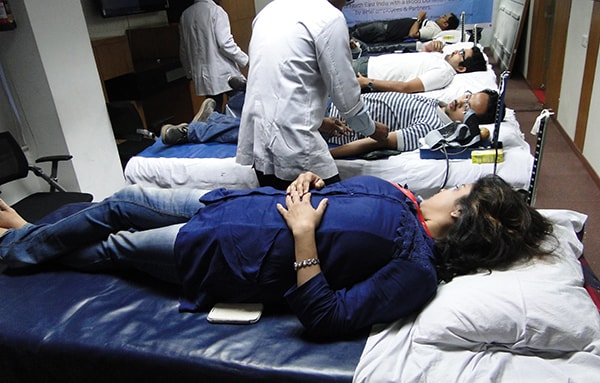
In Karnataka, our Mangalore zone employees visited Aasare, an exclusive home for physically challenged children and distributed fruits and chocolates among kids. Free eye check-up camps were also set up across all five zones in the state.
Everyone in our West Bengal team donated money to provide nutritional supplements to HIV-affected children in ‘Anandaghar’. Together, they collected a sum of ` 32,000. Additionally, two 24-hour helpline numbers were launched to offer help in cases of paediatric HIV. In Assam, our team spent a day with students of Basistha Blind School in Guwahati.
Our team in Northeast states and Assam collaborated with OJU Welfare Association in Arunachal Pradesh to drive a campaign called ‘Clothes for Charity’, where used clothes were collected from all our offices in that zone and were donated to the association. OJU Welfare Association works for the development and empowerment of disadvantaged women and children. In Pune as well, our employees collected daily consumables (clothes, shoes, water bottles, soaps, among others) and donated those to Maher Ashram in the city.
At Bharti Airtel, we have taken up several initiatives for the conservation of food. We tied up with many food vendors and ensured that the surplus food was not wasted. The left-over food was sent to orphanages and old-age homes, so that it got served to the needy.
We dedicated an entire day to the HIV-affected kids of ‘Anandaghar’, where we screened a movie for the kids and offered them refreshments in between the film.
One of our most significant initiatives last year was to collaborate with the Uttar Pradesh government to roll out its state-wide project Dial 100. Dial 100 is an emergency response system, where the state citizens could communicate with the call centre via dialing 100 over phone, text, and other communication methodology. This was a big milestone for the team as it involved setting up UP’s largest call centre.
As one of the world’s leading telecommunication companies, we believe it is possible to drive economic growth across geographies with less impact on the environment. Finding that balance is fundamental to our sustainability commitment.
We evaluate the impact of our operations (including those of our partners) on the environment in terms of resource and energy consumption, greenhouse gas (GHG) emissions and waste. Besides, we ensure that we operate as efficiently as possible to minimise the impact. The United Nations National Climate Change Conference, 2016, recognised climate change as a threat to human life. We believe that the Information and Communications Technology (ICT) industry has a crucial role to play in enabling a low-carbon future.
Airtel has always pioneered green and sustainable energy. There have been path-breaking shifts from the classical telco operating model, whether it has been sharing of passive infrastructure or replacing all indoor cabinets to outdoor. These changes have shaped and impacted the industry in a way no other company has been able to.
Last year, Airtel achieved the milestone of 1 MWp rooftop solar at our main switching centres (msc) sites. This is an unprecedented achievement by any telecom operator in the domain of adopting renewable technology for their msc locations.
A base station with outdoor BTS does not require air-conditioning, which results in potential reduction of energy consumption by 25%. Over 48,973 sites have been converted to outdoor sites. We partnered with Tower Cos to take this initiative forward.
With the advent of 4G technologies, there have been associated innovations in the BTS deployment. One such innovation is the usage of intelligent shutdown technology. This ensures that the equipment remains switched off during non-peak hours.
Project Green City was launched by Indus and Infratel a few years ago; and over 47,937 sites have been tagged as green sites till date.
Across all the facilities in India, we have implemented comprehensive energy conservation and efficiency programmes through the following initiatives:
Installing Variable Frequency Drives (VFDs) A Variable Frequency Drive (VFD) installed in our HVAC systems, automatically reduces a motor’s speed and power draw when there is lower system load.
Cold Aisle Containment Cold aisle containment uses a physical barrier to reduce the mixing of cold supply air and hot exhaust air in data centre aisles. This delivers lower energy consumption and more efficient cooling.
Energy Usage Optimisation: By an extensive energy usage study and power audits conducted, various initiatives were undertaken to optimise the usage of electricity, some of which include:
We, at Bharti Airtel, ensure that our e-waste is disposed off responsibly. E-waste is generated from technology upgradation, capacity augmentation and other procedures.
In FY 2016-17, 2,400+ tons of e-waste from IT and network infrastructure were responsibly recycled through our authorised partners. In addition, we have been donating our end-of-life laptops and IT infrastructure to the Bharti Foundation who, in turn, use the same for their schools program.
We took several significant measures like practising the usage of paperless billing to reduce paper usage and wastage. Our customers are offered the flexibility to opt for paperless bills at any time of their subscription cycle. This helped us save over 1,289 Mn sheets of paper since FY 2011-12. New connections sold with e-Mail/e-Bill options are also increasing and accounts to 56% of total new postpaid connections as of March 2017.

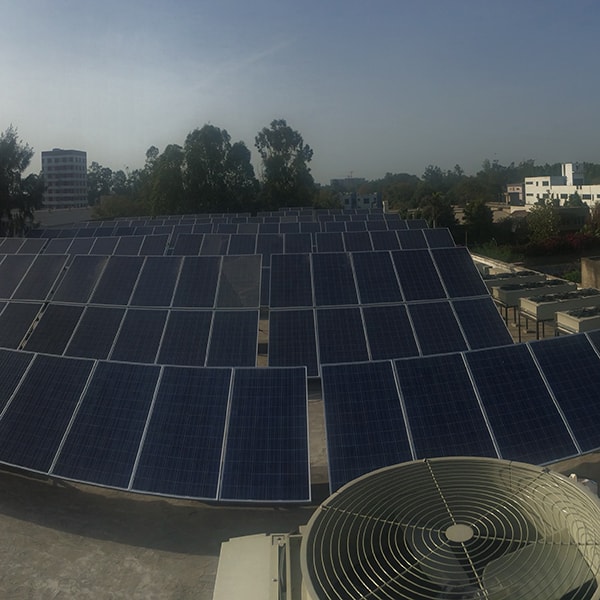
We believe that technology can play a pivotal role in enabling the communities where we operate achieve their developmental aspirations. Our commitment is to enhance the quality of life wherever possible and contribute to a connected society. Over the last few years, we have taken up locally relevant projects in the areas of Education, Youth Development, Health and the Environment. We also extend our services to provide disaster relief in the areas where we operate.
Education is a key focus area for governments and public private partnerships are helping bridge some of the gaps.
To provide the youth in Africa opportunities to fulfil their potential, Airtel is leveraging its technology to enhance skills or provide real opportunities for growth.
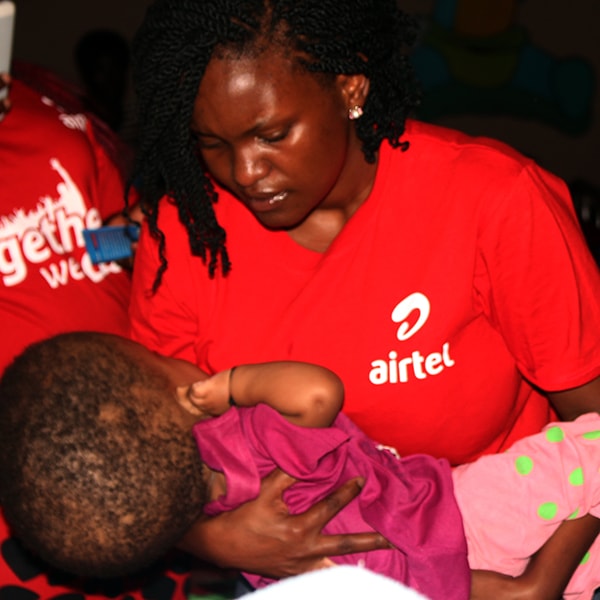
Access to primary health care is a key area of focus for countries in Africa.
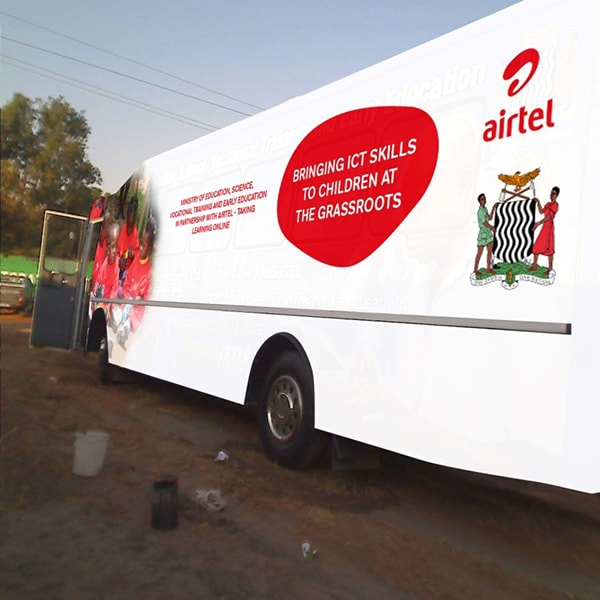
The natural ecosystem is equally important to Airtel and to ensure that we are preserving it, Airtel Africa’s employees partake in planting trees around the year, amongst other initiatives.
I believe that the long-term success of Airtel is tied to the society. Our overarching Corporate Responsibility is to ensure that we operate as a responsible business. In community related CSR initiatives, we work in collaboration with government and development agencies, whilst encouraging employee participation. We remain committed to making a difference to the society that we operate within.
Message from MD and CEO
Raghunath Mandava

2,000
members of Ilaje community were given free HIV screening and counselling
27,000
students reached under ‘Adopt-a- School’ programme
At Airtel Sri Lanka, our CSR approach is attuned to societal needs. We are focused on enriching the lives of people in the communities and act with respect for all stakeholders. Our initiatives across domains of education and health have created significant impact in the lives of millions.
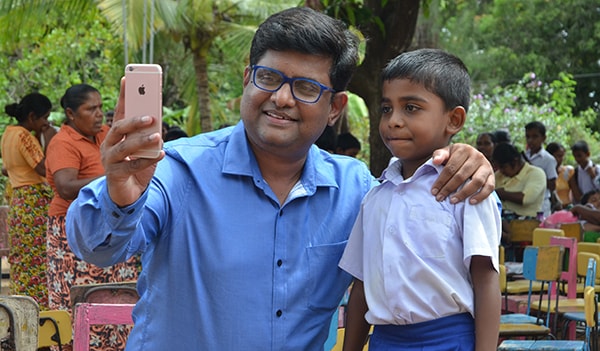
We adopted the Kahatagasdigiliya School in Anuradhapura district, where we took care of the education of 100 children. A similar initiative was taken at Alawal School in Gampaha district, where we could impart the education to 300 children. A holistic approach was taken to empower children with knowledge and education, so that they grow to become responsible citizens.
We undertook the annual refurbishment of The Lady Ridgeway Hospital, which is considered to be world’s largest paediatric government hospital. It impacted the lives of over two million patients. Additionally, to prevent the wide spread of dengue disease across Trincomalee, we initiated our ‘Nets for wells’ campaign, where we went on covering wells with nets to prevent the breeding of mosquitoes. This programme created impact across 500 families of Trincomalee.
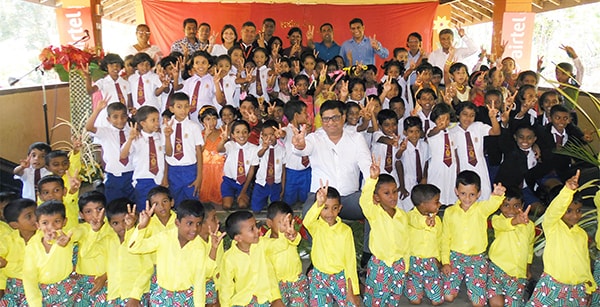
Corporate Social Responsibility initiatives in Sri Lanka have given more emphasis on empowering youth, as they are pivotal for the country’s economic development. As per the studies conducted in 2016-2017, the youth - representing 22% of the local populace, face scores of issues including education and health. Accordingly, in the coming year, we expect to implement initiatives to uplift community resources and incorporate our knowledge and expertise to promote information technology, with the aim of devising an all-inclusive business model to further elevate our CSR initiatives.
CEO Statement
Mr. Jinesh Hegde